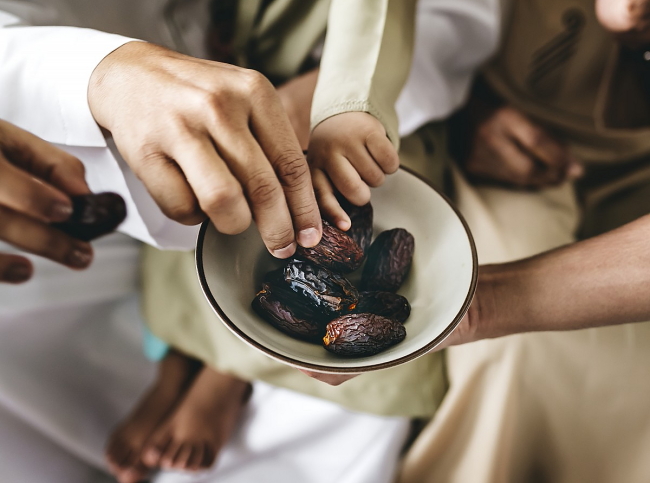
It is customary to break the daily Ramadan fast with three dates. Photo by RawPixel.com, courtesy of PxHere
SUNSET SATURDAY, APRIL 2: Peer into the sky for the sight of a crescent moon, as the world’s 1.8 billion Muslims—nearly a quarter of Earth’s population—begin the month of Ramadan. For Muslims, the period of Ramadan is not fixed: As the Islamic calendar is lunar, the sight of a crescent moon signals the official start of this very important month. (Note: Starting dates in communities around the world may vary by location and by method of calculation. In the United States, this year, estimates are that Ramadan may begin at sundown on April 1.)
The end of Ramadan—the ninth month of the Islamic calendar—is met with Eid al-Fitr, a festival of the breaking of the fast. Eid al-Fitr marks the beginning of the next lunar month, Shawwal, and is a time of great feasting and family celebrations.
NEWS 2022: As pandemic restrictions continue to ease and lift around the world, many Muslims prepare to gather in-person during Ramadan, this year. (Check out this article by CBC News, on the Ramadan 2022 plans of several Muslims.) For those hoping to host guests this year, The National reported on home decor trends appropriate for this year’s observance of Ramadan.
Looking for recipes? Bon Appetit and Epicurious have released menu plan ideas and more for Ramadan 2022.
FASTING & DATES
Muslims observe the month of Ramadan with a strict sunrise-to-sunset fast, which means that nothing passes the lips during those hours. All food and drink (including water) is prohibited. Meanwhile, prayer is increased, as is reading from the Quran. According to Muslim belief, the first revelation of the Quran to Muhammad occurred during Ramadan, and as such, observance of the month is one of the Five Pillars of Islam. During the month of Ramadan, Muslims partake in a pre-dawn meal known as the Suhoor, and do not return to eating until after sunset—with the iftar. Three dates customarily break the fast each day of Ramadan, prior to the iftar.
BEYOND FASTING …
Najah Bazzy, author of The Beauty of Ramadan, reminds readers in her opening pages that Ramadan is about far more than denial of food and water during daylight hours. Bazzy, a nationally known expert on cross-cultural healthcare, covers many of the health-related issues in her book. But she calls on a traditional text credited to the Prophet Muhammad for the deeper meaning of this special month. In addition to fasting, prayer and Quran study:
Give alms to the poor and the needy. Pay respect to your elders. Have pity on those younger than you and be kind toward your relatives and kinsmen. Guard your tongues against unworthy words, and your eyes from such scenes that are forbidden and your ears from such sounds as should not be heard. Be kind to orphans.
ZAKAT GIVING & ‘NIGHT OF POWER’
In addition to fasting, Muslims donate to charity during Ramadan. Charity, known as zakat, sometimes translated as “the poor-rate,” is an obligatory practice.
Laylat al-Qadr, or the “night of power,” is considered the holiest night of the year and commemorates the night the first revelation of the Quran was sent to Muhammad. Around the Islamic world, traditions vary for identifying the date of Laylat al-Qadr—though it is generally believed to fall on one of the odd-numbered nights of the last 10 days of Ramadan.


Tell Us What You Think